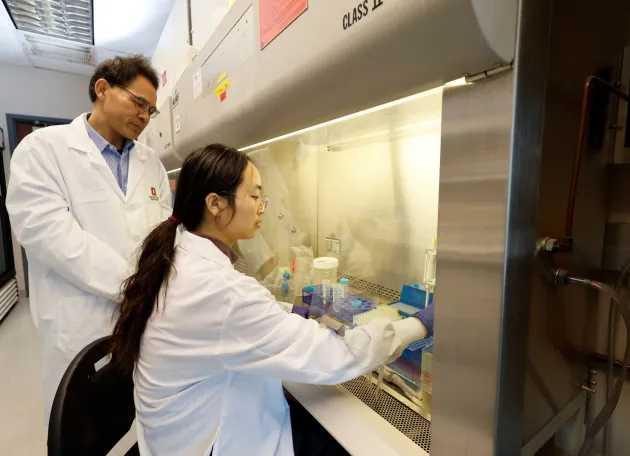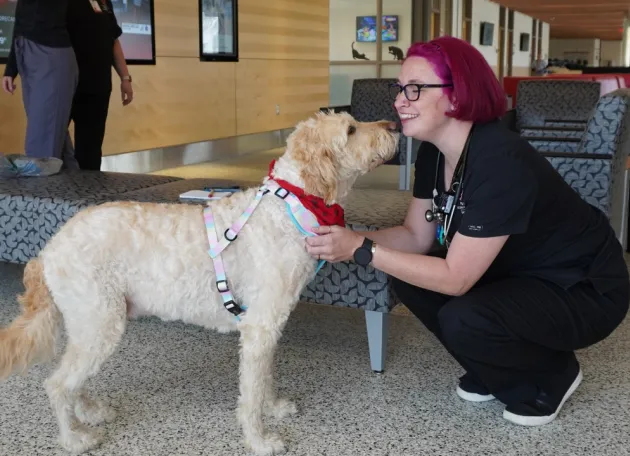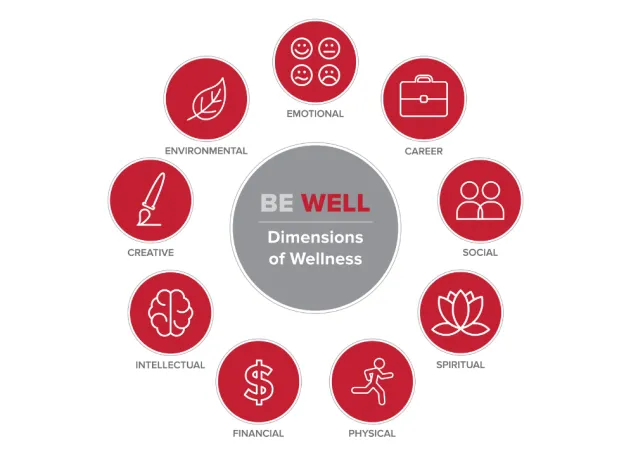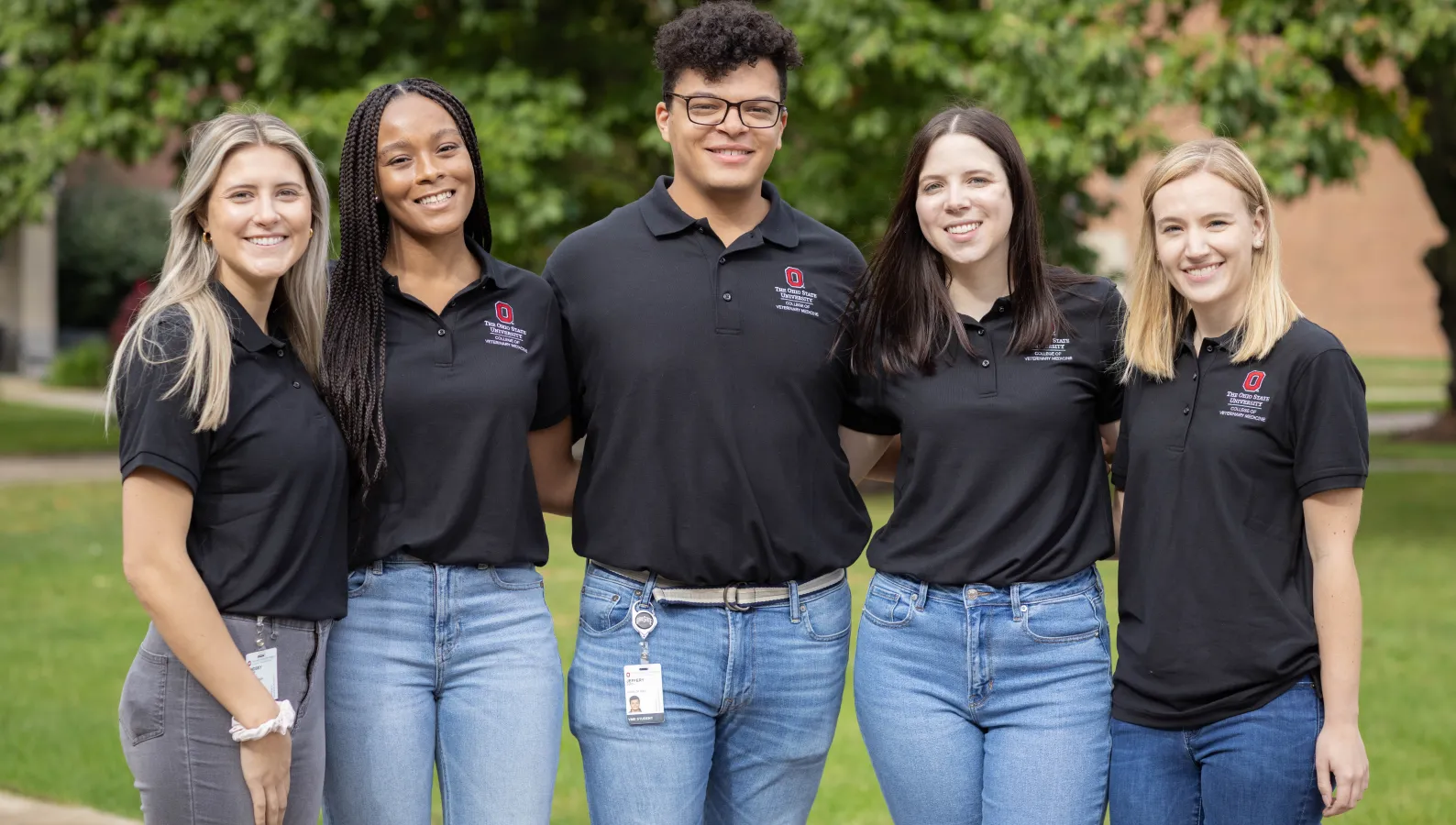A message from the dean
As dean of Ohio State’s College of Veterinary Medicine, I look forward with optimism to building upon the successes the college has achieved over the years. Aligned with our Be The Model® strategic plan, the college supports the multifaceted fields of the veterinary profession. Our graduates play a vital role in maintaining the human-animal bond, protecting our agricultural economy, ensuring a safe and plentiful food supply, researching the latest advances in fighting infectious diseases, treating cancer in pets and humans, and protecting our ecosystems through our One Health approach to these and other mission areas and programs to advance the health of animals, people, and the environment.
Rustin M. Moore, DVM, PhD, Diplomate ACVS
Rita Jean Wolfe Endowed Dean

Preparing the next generation of veterinarians for personal and professional success
The college is advancing education and student success through a new outcomes-based curriculum that focuses on graduating competent and confident veterinarians who are prepared for broad career paths.
In 2019, we began a comprehensive curricular redesign using the Competency-Based Veterinary Education framework, part of a critical paradigm shift in veterinary medicine. Our ‘Preparing for Excellence in Veterinary General Practice’ program has been at the forefront of this new educational approach, including clinical assessment changes such as entrustable professional activities and longitudinal tracking of student performance.
We’ve shifted away from students receiving most of their clinical training through observation of specialty care for complex cases to a more balanced approach by providing hands-on learning across a spectrum of care considerations. This provides students experience with technological advances and higher cost options in specialty rotations as well as a range of care options that can be provided in first opinion practices which are aligned with cost expectations of a diverse client population. This prepares career-ready veterinarians to provide high-quality, affordable care for the broadest range of clients and animals while maintaining sustainable business practices.
In addition to our DVM program, the college offers advanced training programs, including the Comparative Biomedical Sciences Graduate Program (MS and PhD), a specialization in Veterinary Public Health, provided through a unique partnership with the College of Public Health, specialty resident training and internship programs.
10k+
DVM, MS, MPH, PhD alumni
700+
students currently enrolled in programs
80%
of Ohio veterinarians are alumni
Veterinary science has been a part of Ohio State’s long history since the university’s founding as Ohio A&M. University trustees recognized the enormous proportion of the state's wealth was invested in livestock and sensed the need for its adequate protection from contagious diseases, petitioned the legislature for the establishment of a veterinary college.
As the nation’s third veterinary college, the early curriculum focused on support the state’s agricultural economy, concentrated on the horse as the nation’s chief mode of transportation off the farm and as the mighty tiller of soil on it. Since then, the curriculum has evolved to support not only farms, but the beloved pets that provide companionship and support.
Impactful research to improve the health of people and animals
Collaboration across the university and beyond is a core tenet of our research program, and a key strategy for our One Health and comparative and translational biomedical approach to creating a healthy and sustainable world for animals, people and the environment. We’re addressing grand challenges such as transboundary, (re)emerging, and zoonotic diseases, antimicrobial resistance, and others. Researchers in the signature program areas of comparative and translational oncology, infectious disease and neuromusculoskeletal science are impacting not only veterinary medicine but human health care as well.

Innovative care to protect the human and animal bond
The college’s clinical veterinary services provide care that preserves the human-animal bond and protects Ohio’s agricultural economy and food supply. The Veterinary Health System encompasses a companion animal primary care practice and two specialty care hospitals, a hospital for farm animals, equine center and farm and equine field services. In the last year, the health system treated over 80,000 canine, feline, equine, and farm animal patients in our hospitals and on farms across Ohio

Fostering community, respect and well-being
The college is committed to fostering community and respect at The Ohio State University College of Veterinary Medicine. We believe that a supportive and respectful community is crucial for strengthening and positioning the veterinary profession for service, excellence, and impact.
The college works to support a culture of well-being through counseling, consultation, and education that supports our students in their pursuit of academic and personal development, empowering them to become successful members of the veterinary community and beyond. The Be Well program is a comprehensive and integrated health and wellbeing initiative that incorporates evidence-based approaches, outcome assessments, and programming specific to academic and healthcare professionals and veterinary students.


